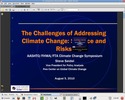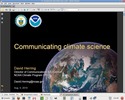Transportation industry grapples with global warming
Last updated Sep 27, 2010 — 32 views Presentation slides and a summary video from a recent transportation-focused Climate Change Symposium are now available online for public access. Cosponsored by U.S. federal and state transportation agencies, the symposium’s objective was to help state transportation departments address the challenges posed by global warming.
Presentation slides and a summary video from a recent transportation-focused Climate Change Symposium are now available online for public access. Cosponsored by U.S. federal and state transportation agencies, the symposium’s objective was to help state transportation departments address the challenges posed by global warming.
The Climate Change Symposium, which took place Aug. 5-6, 2010 in Washington D.C, consisted of 15 sessions having from one to four talks each. It was jointly organized by the American Association of State Highway and Transportation Officials (AASHTO), the Federal Highway Administration (FHWA), and the Federal Transit Administration (FTA), among other organizations.
Presentations ranged from strategies for reducing greenhouse gas emissions, to adapting transportation systems to the effects of climate change, to a review of key climate change-related initiatives at the federal, regional, and state level.
Climate change: myth or reality?
Two particularly interesting talks occurred early in the conference, in a session that examined the global warming myths vs. reality dispute, and the challenge of developing “climate literacy” throughout our society.
 Steve Seidel, of the Pew Center on Global Climate Change, talked about “The Challenges of Addressing Climate Change: Science and Risks.” Seidel’s talk began by acknowledging efforts by some to disprove or deny the severity of climate change, and then proceeded to debunk the myths being perpetrated by global warming deniers.
Steve Seidel, of the Pew Center on Global Climate Change, talked about “The Challenges of Addressing Climate Change: Science and Risks.” Seidel’s talk began by acknowledging efforts by some to disprove or deny the severity of climate change, and then proceeded to debunk the myths being perpetrated by global warming deniers.
He cited scientific research from the U.S. Global Change Research Program (U.S. GCRP), which has established that…
- Global warming is unequivocal and mostly human induced
- Climate changes are underway in the U.S. and projected to grow
- Widespread climate-related impacts are occurring now and are expected to increase
“Given the overwhelming scientific evidence, the risks of not acting would appear to far outweigh the costs of acting now,” so it’s critical that we “avoid the unmanageable and manage the unavoidable,” he concluded. Seidel’s presentation slides are available here (pdf file).
 Next, David Herring, of the National Oceanic and Atmospheric Administration (NOAA), addressed the challenges of “Communicating Climate Science” to the public. “Climate literacy” is being undermined in two important ways, he suggests:
Next, David Herring, of the National Oceanic and Atmospheric Administration (NOAA), addressed the challenges of “Communicating Climate Science” to the public. “Climate literacy” is being undermined in two important ways, he suggests:
- “FUD” (fear, uncertainty, doubt) campaigns, fomented by global warming deniers and by corporations with vested interests in the status quo
- The tendency of news media to “balance” their climate change coverage, by citing the skeptics’ side of the story (e.g. “Who knows what’s really true?”), despite the preponderance of evidence supporting the reality of global warming
A significant contributor to misinformation — and disinformation — regarding climate change is the growing trend of obtaining news and information from Internet sources, such as blogs and social networks, notes Herring in several slides that show media use trends and other survey data.
Next, he describes NOAA’s efforts to educate the public regarding the realities of climate change, including via a dedicated climate services website, whose home page provides a Global Climate Dashboard with graphs showing steady increases in global temperature, CO2, and sea level over the past half-century (check it out!). You can access Herring’s presentation slides here (pdf file).
Climate Change Symposium Agenda
The complete two-day event’s agenda appears below. A link for accessing the video and most presentations’ slides appears thereafter.
- Introduction and Overview:
- Paula Hammond, of Washington DOT
- John Horsley, AASHTO
- Gloria Shepherd, FHWA
- The Challenge of Climate Change:
- The Challenges of Addressing Climate Change: Science and Risks — Steve Seidel, Pew Center
- Communicating Climate Science — David Herring, National Oceanic and Atmospheric Administration
- Federal Policy Status Report:
- Climate Change Legislation in Congress — Alex Barron, House Energy and Commerce Committee
- EPA Regulatory Developments — Sarah Dunham, U.S. Environmental Protection Agency
- CEQ Project-level GHG Analysis — Horst Greczmiel, Council on Environmental Quality
- Integrating GHG Reduction Strategies in Transportation Planning: State Policy Developments:
- New York State Energy Plan and Climate Action Plan — John Zamurs, New York DOT
- Moving Washington Toward Sustainability: WSDOT Planning Actions in Response to HB 2815 and EO 09-05 — Brian Smith, Washington DOT
- Integrating GHG Reduction in Policy and Planning in Oregon — Margi Lifsey Bradway, Oregon DOT
- California Senate Bill 375 Implementation — Rob Rundle, San Diego Association of Governments
- EPA’s MOVES Model:
- Using MOVES2010 for Estimating ON-Raod GHG Emissions — Laura Berry, US EPA
- Transportation Strategies to Reduce GHG Emissions; A National Perspective:
- Role of Technologies and Alternative Fuels — David Greene, Oak Ridge National Laboratory
- U.S. DOT Report to Congress on Transportation’s Role in Reducing U.S. Greenhouse Gas Emissions — Linda Lawson, U.S. DOT
- Transportation Actions Included in State Climate Action Plans — Diane Turchetta, FHWA
- Transportation Strategies to Reduce GHG Emissions: State Initiatives:
- Transportation and Climate Change in Maryland — Don Halligan, Maryland DOT
- NY-DOT’s Maintenance and Operations Strategies — Gary McVoy, New York DOT
- Carbon Sequestration on Interstate ROWs Pilot Program — Frank Pafko, Minnesota DOT
- TX-DOT’s Sustainable Pavements: Low Carbon Materials/Alternative Pavements — Dianna Noble, Texas DOT
- Breakout Groups on GHG Mitigation Strategies:
- Integrating GHG Reduction in Transportation Planning — Janet D’Ignazio and Michael Grant, ICF International
- Integrating GHG Reduction in Transportation Construction, Maintenance, and Operation — Anne Choate, ICF International
- Setting the Stage: Adaptation’s Role in State Climate Action Plans, Federal Climate Policy, and State Climate Policies:
- Federal Climate Adaptation Efforts — Linda Lawson, U.S. DOT
- An Update from Our Laboratories of Democracy: Transportation Adaptation in the States — Vicki Arroyo, Georgetown Climate Center
- Understanding the Effects of Climate Change on Transportation:
- Climate Change: An Adaptation Challenge for US Transportation — Michael Savonis, FHWA
- Regional Climate Change Effects Report — Rob Kafalenos, FHWA
- National Efforts to Reduce the U.S. Transportation System’s Vulnerability to Climate Change Effects:
- FHWA Strategy on Adaptation to Climate Change Effects — Butch Wlashcin, FHWA
- Vulnerability/Risk Assessment Conceptual Model and Pilots — Michael Culp, FHWA
- NCHRP 20-83(05) Climate Change and the Highway System: Impacts and Adaptation Approaches — Michael D. Meyer, Georgia Transportation Institute
- State-Level Adaptation Initiatives:
- State Level Adaptation Initiatives: California’s Experience — Garth Hopkins, California DOT
- Arctic Civil Infrastructure and Adaptation to Climate Change — Michael J. Coffey, Alaska DOT
- Washington State’s Integrated Climate Change Response Strategy — Nancy Boyd, Washington DOT
- Pennsylvania’s Climate Change Activities — Danielle Spila, Pennsylvania DOT
- Where Do We Go from Here?
- TRB Special Report 299: A Transportation Research Program for Mitigation and Adaptation to Climate Change and Conserving Energy — Emil Frankel, Bipartisan Policy Center Director
- Results from TRB Research Workshops — Shari Schaftlein, FHWA
- Facilitated Discussion of Research Needs — Anne Choate, ICF International
Accessing the video and presentation slides
Presentation slides for most of the talks listed above, along with a 1.5 hour video summary and discussion of what took place at the Climate Change Symposium, are available here. Additionally, a written summary of the highlights of the symposium is available here (pdf file).
Additional information
For additional information regarding transportation-centric climate change initiatives in the U.S., visit the following websites:
- ASSHTO climate change website
- Center for Environmental Excellence
- Federal Highway Administration climate change website
- Transportation and Climate Change Clearinghouse
All of the available video and downloaded materials from the August 15-16 symposium may be accessed on AASHTO’s website, here.